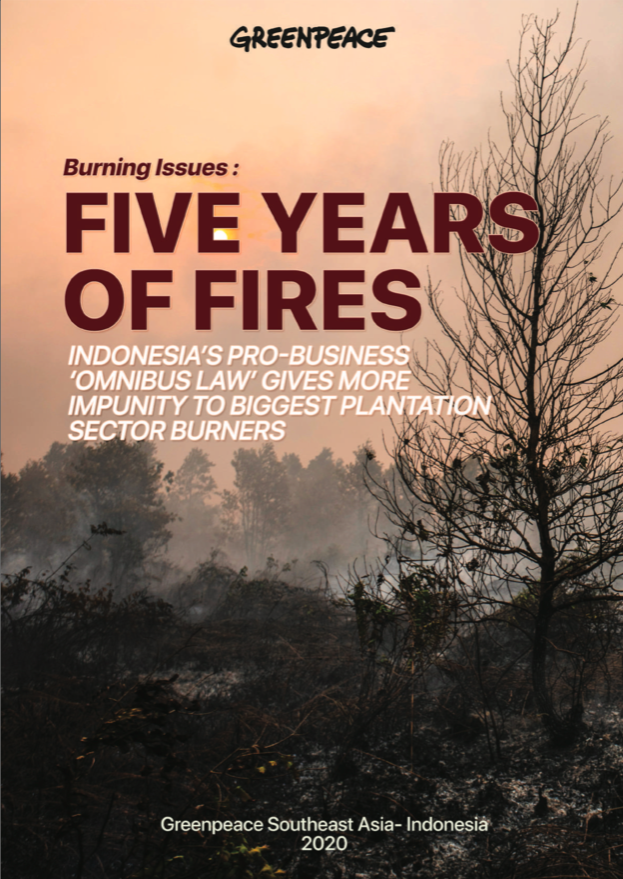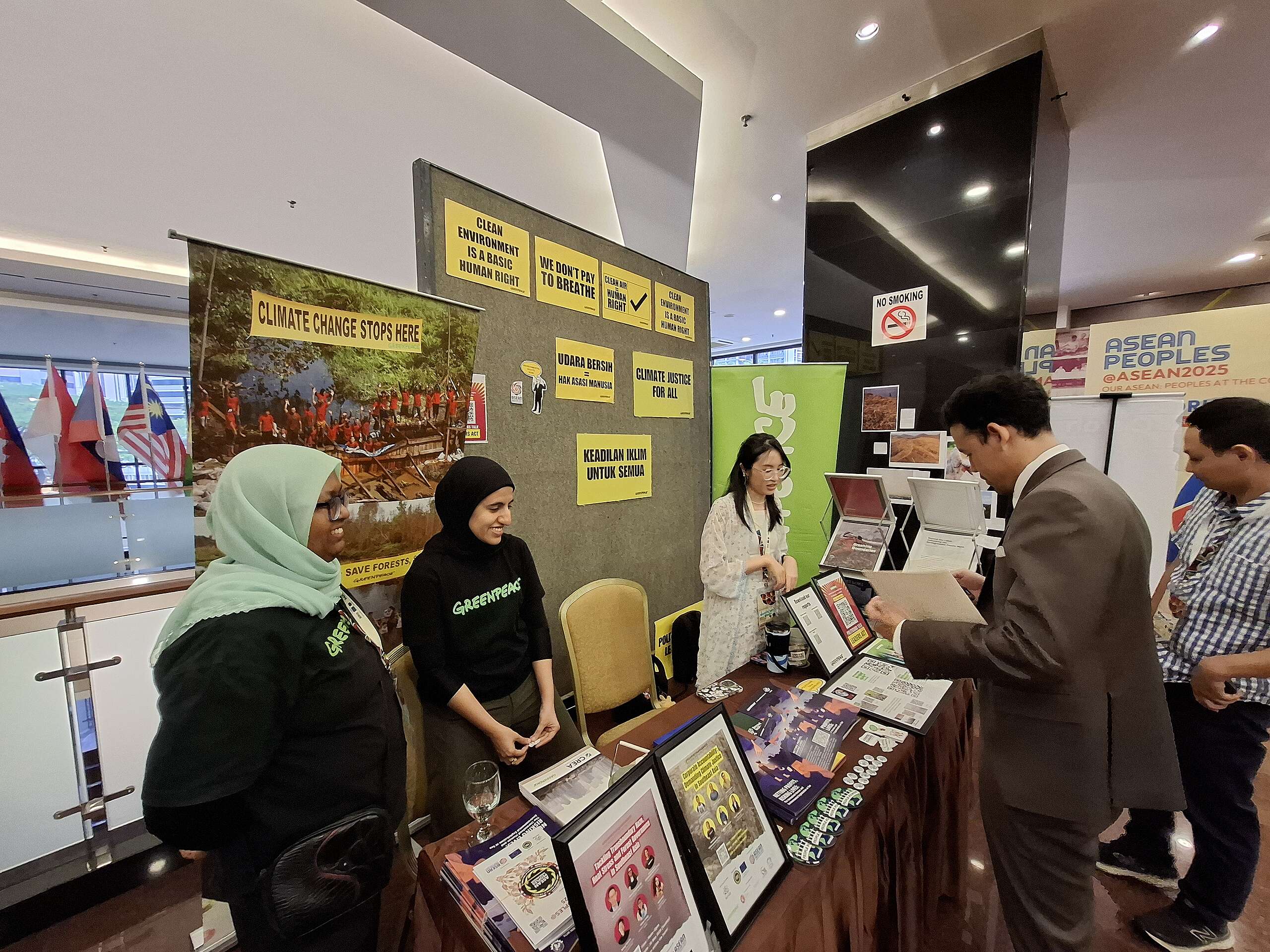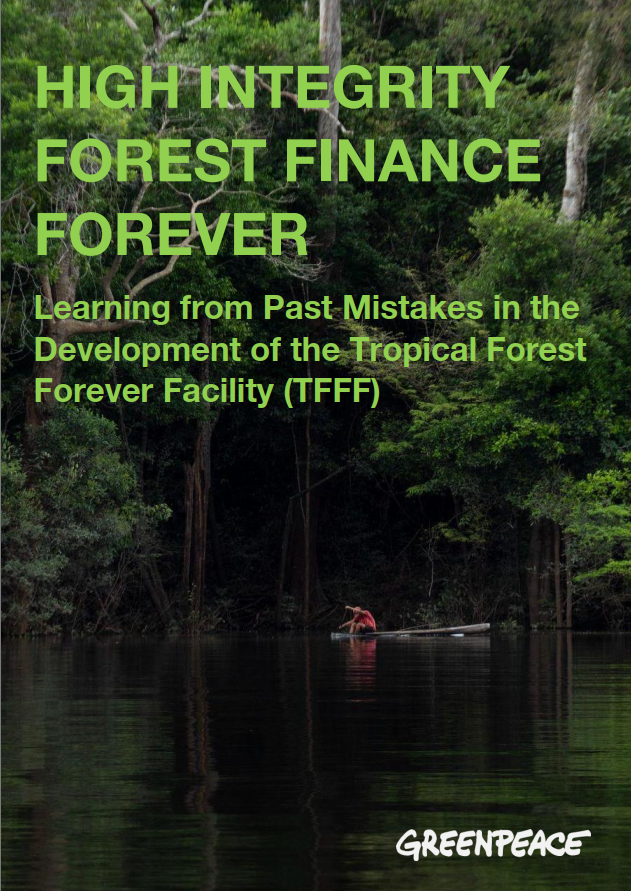Executive summary
The 2015 fire season in Indonesia was the worst in nearly two decades, with the blazes for almost a month emitting daily carbon emissions that exceeded those from the entire US economy.1 In response to this crisis, the Government of Indonesia pledged to impose strict accountability measures on the companies responsible for preventing land under their management from burning.2 The goal was to prevent a repeat of the disastrous 2015 fire episode, the haze from which caused respiratory and other illnesses in hundreds of thousands of people across the Southeast Asia region and led to an estimated $16 billion in losses to the country’s forestry, agriculture, tourism and other industries.3
However, despite the promises, over the following years the government failed to enforce its own laws while hundreds of thousands more hectares of forest and peatland burned within palm oil and pulp concessions. Some of the biggest plantation companies in the world have been responsible for the areas suffering the worst of the fires, yet they have largely evaded criminal punishment and continue to operate business as usual:
- Between 2015 and 2019, 4.4 million hectares of land – an area larger than the Netherlands – have burned in Indonesia, according to a Greenpeace4 analysis. Some 789,600 ha of this area (18%) has burned repeatedly.
- The plantation sector bears considerable responsibility for the fires in this period, with 27% of the mapped burned areas in 2019 located in palm oil and pulpwood concessions.
- The data available to Greenpeace shows that over this five-year period the government has broken its promise to strictly enforce the laws for palm oil and pulp companies, with only a very limited number of cases resulting in criminal charges, civil lawsuits or payment of fines by these companies. The data shows that between 2015 and 2019 a total of 258 administrative sanctions were issued, with 51 criminal charges and 21 civil lawsuits filed. These numbers are different from those reported by the Ministry of Environment and Forestry, which Greenpeace was not able to verify. The ministry claims to have filed 19 civil lawsuits and says guilty verdicts have been returned in nine of these cases, with the companies ordered to pay fines for material compensation and restoration5 – yet according to the ministry, as of April 2020 only one company had complied6. The ministry itself has brought criminal charges against companies in just five cases, resulting in four guilty verdicts.7 Considering the scale of the burning, with the damage in 2019 approaching that seen in 2015, the government’s response does not seem to indicate serious and effective law enforcement.
Today Indonesia’s forests, peatlands and communities face a new threat. Working hand-in-glove with the plantation sector, the Government of Indonesia has drafted and passed into law an ‘omnibus bill’ that contains numerous deregulation measures designed to weaken environmental protections and lower the standards to which companies from the palm oil and pulp sectors are held when opening up new areas for their plantations. This means a potentially even greater risk of fire within the plantation sector, with even less liability risk. Criticisms of the bill, widely viewed as prioritising business interests at the expense of the people and the environment, include:
- Undue influence by vested interests: Indonesia’s palm oil and pulp business associations (GAPKI and APHI) were part of the task force charged by the government with drafting the omnibus bill, and thus had wide scope to influence its design to the benefit of these sectors. Their members include many of the palm oil and pulp companies identified by Greenpeace as having the largest burned areas within their concessions over the 2015–2019 period.
- Weakened liability: Under the new law, companies with fires in their concessions will enjoy even more impunity as the concept of strict liability for environmental harms has been weakened.
- Weakened transparency and weakened enforcement: These efforts to limit companies’ responsibility for the damage caused by land and forest fires are being made at the same time as transparency on law enforcement is diminishing. Together, these factors are a recipe for more major fire disasters to happen in the future, contributing to a health, climate, biodiversity and economic crisis affecting the region and the world.
Our planet and its people are facing a triple emergency of climate change, threats to biodiversity and vulnerability to novel diseases. Radical and systemic transformation of the natural resource economy is essential to addressing this challenge while upholding social justice. The Indonesian government, its trade partners, the plantation sector and the consumer companies that profit from it must recognise their role in creating these crises and assume their responsibility for tackling them. Amazon and Russia.
Radical action is needed from consumer companies, traders, plantation companies and governments to ensure that law enforcement, policy, trade and finance drive – rather than undermine – the urgent need to protect, restore and regenerate natural ecosystems, rein in greenhouse gas emissions and uphold the rights of communities and workers.
The Indonesian government must:
- Align the economy with goals of biodiversity and climate protection, along with social justice: Ensure that public finance, trade policy and overseas cooperation do not drive further deforestation, but instead support nature restoration and a transition to a green, just and resilient economy. Urgent action must be taken to:
- Revise the omnibus law to prioritise people and the environment.
- Undertake and expand the long-promised concession review covering all natural resource sector landholdings, rather than just oil palm.
- Increase transparency: Indonesia’s constitution supports the principles that access to public information is a fundamental right and that disclosure of public interest information is an administrative duty. Greater transparency must be provided with regard to company concessions, including locations and beneficial ownership, and the progress of law enforcement efforts (with a focus on accountability).
- Ensure joined-up action by responsible authorities on cases involving fire and other legal violations within the natural resource sector, including the plantation sector.
- Defend Indigenous rights: Support Indigenous Peoples in securing recognition and protection of their lands and customary rights.
The market must:
- Drop destroyers: Close the market to groups linked to deforestation, ecosystem destruction and abuses of human rights, in particular the rights of Indigenous Peoples.
- Drastically reduce trade of forest and ecosystem risk commodities (FERCs):To create space for economies that work with nature and respect local communities, overall trade and consumption of commodities such as palm oil and pulp needs to be reduced. This starts with the rapid phase-out of biofuel from food crops.
- Stand for transparency: Honour zero-deforestation commitments and make full supply chain transparency a condition of trade. Require suppliers to have open and comprehensive monitoring systems in place by no later than 1 January 2021.
Governments of consumer countries and, where applicable, regional jurisdictions such as the EU must adopt laws regulating domestic markets for commodities and derived products entailing a risk for forests and ecosystems, to ensure that they can be sold only if they meet strict sustainability and human rights criteria.
Download the full report here.
References:
1 Straits Times (2016), Harris N et al (2015)
2 See eg Gumilang P (2015) and Bisnis.com (2017).
3 World Bank (2016) p4
4 In this briefing, mentions of ‘Greenpeace’ should be read as references to Greenpeace Southeast Asia unless otherwise stated.
5 Ministry of Environment and Forestry (2020b)
6 Letter S.159/HUMAS/PPIP/Hms.3/4/2020, dated 13 April 2020. Copy held by Greenpeace Indonesia.
7 Three of these cases were disclosed in letter no. S.159/HUMAS/PPIP/Hms.3/4/2020, dated 13 April 2020 (copy held by Greenpeace Indonesia). The others were reported in the media: see Saputra A (2017) and Tribun Jambi (2019). See also Supreme Court of the Republic of Indonesia (2019).




